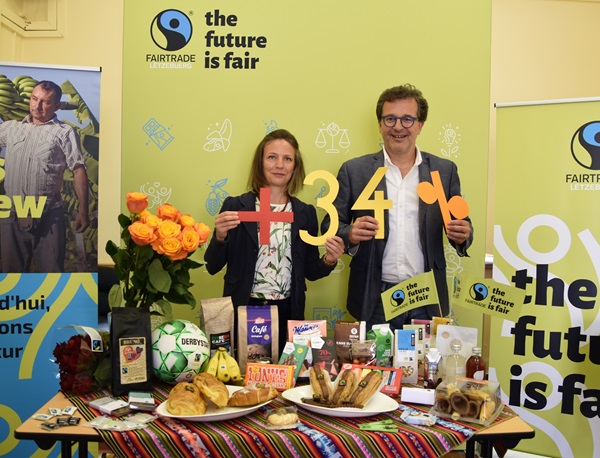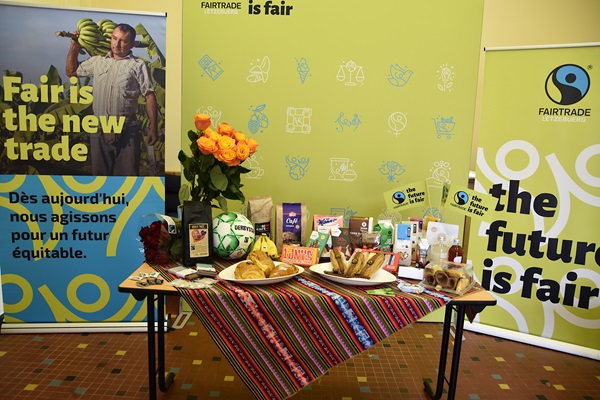 Credit: ©Fairtrade Lëtzebuerg
Credit: ©Fairtrade Lëtzebuerg
On Thursday 25 July 2024, Fairtrade Lëtzebuerg announced that it saw significant growth in 2023, despite high inflation rates, including Luxembourg's 3.2%, which severely impacted consumers' purchasing power globally.
Luxembourg customers spent an average of €79 per year on Fairtrade products, €19 more than in 2022. This consumer support helped Fairtrade product sales reach €52.3 million, a 34% increase from the previous year, positioning Luxembourg among the top Fairtrade consumers in Europe.
Fairtrade Lëtzebuerg attributed its success in Luxembourg in 2023 to the diverse and expanding range of Fairtrade products. The market featured 327 companies offering Fairtrade products, including 27 from Luxembourg, which introduced 47 new local products. The market boasted 5,250 Fairtrade-labelled products by the end of 2023, a 14% increase from 2022, with 60% also carrying the organic label. This broad product range included coffees, cashew nuts, teas, pineapples, chocolate products and more.
Two key sectors driving fair trade in Luxembourg in 2023 were Fairtrade roses and cashew nuts. Over 1.96 million Fairtrade rose stems were sold, a 273% increase. Studies highlighted the environmental benefits of Kenyan Fairtrade roses, which generate significantly fewer CO₂ emissions compared to Dutch greenhouse-grown roses despite the transport distances. Additionally, Fairtrade-certified floriculture workers in East Africa enjoyed better wages and working conditions.
Fairtrade cashew nuts, introduced in late 2023, quickly gained popularity due to their high quality and short supply chain. Unlike the common practice of processing cashews in Asia, the Luxembourg Fairtrade supply chain ensures processing occurs in the producing African countries, reducing CO₂ emissions and benefiting local economies.
Fairtrade bananas, a staple in Luxembourg since 1999, saw a 5% increase in sales to 2,057 tonnes in 2023, with 89% also certified organic. Fairtrade sugar sales rose 28% to 203 tonnes, largely due to a Luxembourg company's switch to Fairtrade sugar pods. Fairtrade tea sales increased 24% to 2.3 tonnes but remain underrepresented in larger stores and restaurants. Despite logistical challenges in 2023, Fairtrade coffee sales showed resilience, with Luxembourg roasters increasing their market share to 40%. With 480 tonnes sold in 2023, Fairtrade coffee has a market share of 12%.
Fairtrade cocoa experienced a 13% decrease in sales to 552 tonnes due to a foreign brand's market exit, yet Luxembourg players improved their market share to 9% compared to 7.1% in 2022. With an average of €79 per capita spent on Fairtrade products, Luxembourg ranks highly in Europe, behind Switzerland (€113) but ahead of Austria (€73), Belgium (€28), Germany (€30) and France (€20).
The non-profit organisation Fairtrade Lëtzebuerg noted it benefits from strong support networks, including 38 Fairtrade Gemeng municipalities and 27 Fairtrade School certified schools. Over 300 local action group members champion fair trade values such as respect, justice and equality. Companies across various sectors, including historic Weltbutteker shops, medium and large stores, organic stores, small grocery shops and wholesalers, contribute significantly by offering Fairtrade products. Catering companies also participate in the ONLY programme, ensuring the availability of Fairtrade and organic bananas year-round.
Fairtrade Lëtzebuerg's partners and networks support producers and workers in Africa, Asia, Latin America and the Caribbean, enhancing their lives through fair trade premiums and support programmes. According to the latest figures from the 2023 Monitoring Report of the Fairtrade International organisation, the Fairtrade premium paid to more than 2 million producers and workers grouped in 1,910 Fairtrade-certified organisations spread across nearly 70 producing countries to finance community projects, now amounts to more than €222 million.
The movement also assists producers in meeting new European regulations, such as the deforestation law and the Corporate Sustainability Due Diligence Directive (CSDDD), which promotes human rights and environmental protection.
Fairtrade noted that its values are reflected in Luxembourg's 2023-2028 coalition agreement, which aims to promote fair trade and equitable relations with partner countries. The NGO Fairtrade Lëtzebuerg will work to ensure these commitments are upheld in public procurement and government economic policy, urging all stakeholders to support sectors that respect human rights and the environment. As emphasised by the late Francisco van der Hoff, co-founder of the Fairtrade movement, fair trade is a collective effort, and “[...] we do not have the right to live at the expense of others”.

©Fairtrade Lëtzebuerg








